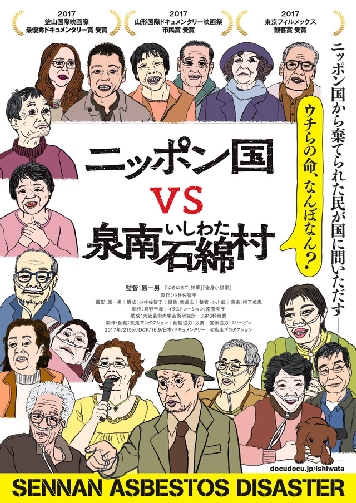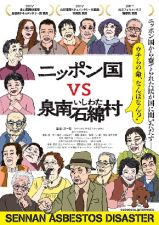Tuesday, February 13, 2018, 17:00 - 21:30
An iconoclastic filmmaker returns with a provocative plea for justice from the government
Sneak Preview Screening: "Sennan Asbestos Disaster (Nipponkoku vs. Sennan Ishiwata mura)"
followed by a Q&A session with legendary director Kazuo Hara
Tuesday, February 13, 2018, 17:00 – 21:30*

*Please note early start time; there will be one intermission.
In Japanese with English subtitles
Japan, 2017 215 minutes
Director: Kazuo Hara
Producer: Sachiko Kobayashi
Featuring: Former Sennan asbestos factory workers, their lawyers and supporters
Film courtesy of Shissoh Productions
The long-awaited new documentary from legendary filmmaker Kazuo Hara ("The Emperor's Naked Army Marches On") has already won coveted Audience Awards at the Yamagata International Documentary Film Festival and Tokyo FILMeX International Film Festival, and received the Best Asian Documentary Award upon its international premiere at the Busan International Film Festival. Despite its length (nearly 4 hours), its festival screenings have drawn standing-room-only crowds and ignited passionate post-viewing discussions.
Ten years in the making, "Sennan Asbestos Disaster" chronicles the prolonged struggle of former workers and relatives of workers in Osaka's Sennan district, an erstwhile "asbestos village" that once hosted the largest number of asbestos factories in Japan. The district flourished from the late Meiji through the Showa periods (1868-1989), boasting over 200 processing plants at its peak, and lured thousands of uneducated job-seekers from the Japanese and Korean countrysides.
But as we all know now, when asbestos is inhaled, it eventually causes mesothelioma cancer, mesothelial tumors and other respiratory conditions. Although the Japanese government was well aware of the health hazards involved, it continued to prioritize economic development above human health long after other nations had ceased manufacturing the material, and neglected to implement either health regulations or countermeasures.
In 2006, some 60 Sennan plaintiffs filed a lawsuit against the Japanese government seeking compensation for irreversible damages to their health. In the first half of "Sennan Asbestos Factory," Hara sketches in the history of Japan's sprawling asbestos industry and introduces us to the plaintiffs. In the second, we follow them as their lawsuit drags on, and they finally journey to Tokyo in search of support and answers.
One watches "Sennan Asbestos Factory" on the edge of the seat, with a mounting sense of horror and despair as the government wages a war of attrition against the ailing plaintiffs, many of whom suffer from ticking time-bomb ailments. As the years stretch on, many of them will gradually succumb, not surviving to see their court cases through.
A firebrand whose work often takes aim at the Powers That Be, Hara's latest masterpiece is a harrowing exploration into the inhumanity of capitalism, colonialism and the state. There is nothing quite as heartbreaking as an indifferent government that, after finally half-admitting it is culpable for imperilling thousands of lives, continues to deny the victims any true measure of justice.
Join us for this sneak preview of Kazuo Hara's "Sennan Asbestos Disaster" before it opens in March in Japan. It is absolutely essential viewing.
For more (in Japanese): http://docudocu.jp/ishiwata/
KAZUO HARA studied photography before founding Shissoh Productions in 1972 and making his directorial debut with the documentary "Goodbye CP," about changing relationships between the disabled and the able-bodied. His acclaimed follow-up, "Extreme Private Eros: Love Song 1974," profiles Hara's ex-wife. In 1987, "The Emperor's Naked Army Marches On" followed a former soldier and his relentless hounding of his superior officers, as he tried to hold them accountable for their actions in World War II. It became a huge hit, winning a Best Newcomer Award from the Director's Guild of Japan, the Berlin International Film Festival's Caligari Film Award, the Cinéma du Réel's Grand Prix, and many other accolades. Hara's 1994 "A Dedicated Life," about novelist Mitsuharu Inoue, topped Kinema Junpo's Best 10 list for that year. Hara is actively involved in cultivating new filmmakers, teaching at the Japan Institute of the Moving Image, Waseda University, Osaka University of Arts and other institutions, as well as holding his own celebrated film studies workshops. Retrospectives of his work have been held at international film festivals in Buenos Aires, Montreal, Sheffield, Amsterdam and elsewhere.
Please reserve in advance, still & TV cameras inclusive, at the FCCJ Reception Desk (3211-3161) or register below. You may attend the Q&A without attending the screening, but you will not have seating priority. All film screenings are private, noncommercial events primarily for FCCJ members and their guests.
- Karen Severns, Film Committee


